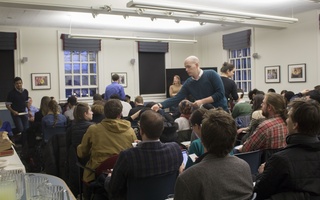We lose something when we ask “is it legal?” without also asking “is it good?” It is the lower standard of the former to which we often rally when we defend our allies and the higher standard of the latter when we confront those whom we oppose. Our ideological blinders prevent us from being consistent in the questions we ask. And yet, decency requires consistent concern for goodness and not merely legality.
It is the lower standard of legality to which the members of the Harvard Graduate Student Union-United Auto Workers have sunk throughout their organizing efforts. During the authorization campaign, the effort to satisfy the thresholds needed to hold an election, union organizers acquired the signatures of over 60 percent of the proposed bargaining unit, far exceeding the 30 percent required for an NLRB-brokered election, but in the subsequent vote, the first election, only 37 percent of the bargaining unit voted to unionize, with 1,526 voting against, 1,396 in favor, and 828 not voting. By the final tally, nearly 40 percent fewer students voted for unionization as signed authorization cards. Those signatories filled out a card with the stated purpose authorizing the HGSU-UAW to “represent me for the purposes of collective bargaining with my employer over wages, benefits, working conditions and other terms and conditions of employment.”
Though students may have changed their minds in the intervening months, one plausible explanation for the union losing two-fifths of its putative supporters between the authorization campaign and the first election is that the organizers failed to explain what signing the card really meant, either due to good-faith miscommunication or misplaced zealotry for the pro-union cause. They may have been content with getting students’ signatures—the legal requirement. But if this is true, they did not build consensus around unionization nor respect their fellow students enough to ensure that they meant what they signed.
Similarly, the HGSU-UAW’s appeal of the first election results was perfectly legal, but it was done disrespectfully, without regard to decorum or decency. Bringing a union to campus should be done with broad consensus—a consensus that the authorization campaign arguably implied, but the first election results clearly showed did not exist. Without consensus, unionization becomes coercive, as all members of the bargaining unit are required to contribute to the union and allow it to advocate on their behalf. Nevertheless, with the declared support of only 37 percent support of eligible voters, the organizers brazenly continued advocating for unionization and, in a series of NLRB hearings, won the right to a second election.
Thus, with the HGSU-UAW walking on a legal tightrope, the second election was held, with 1,931 voting in favor, 1,523 against, and 1,594 not voting. Despite having only won with a minority (38 percent) of students’ support, the organizers treated the result as a triumph, cooing in a press release: “This has been an incredibly long haul, and we are so energized by this vote ... We are confident that our union will be good for us and good for the University.” The organizers have doubled down on this tone-deaf presumption in the weeks after the election; there have been no serious efforts to engage with the many students who voted against unionization, only calls to become a union member and participate in the process of electing a bargaining committee.
This arrogance is also visible in the union’s communication with the bargaining unit, in which the organizers consistently use the first person plural possessive, as in: “our union,” “our election,” “our Bargaining Committee,” and “our contract.” Directed toward students who have not become union members, this language is nonsensical and yet distasteful, as it brushes aside the individual’s choice of whether or not to join. (Though all students are required to financially support the union, there is no requirement to actually join it, which would include membership in the national UAW organization).
The HGSU-UAW rushes on, but for it to be a durable institution that brings meaningful, positive change to Harvard, it must start thinking beyond the merely legal. It must work with as much energy at bringing all voices from the bargaining unit together as it did in organizing the election. It must start to show respect for all student workers, particularly those who opposed unionization. Finally, it must act with more self-awareness, acknowledging that a majority of students did not desire unionization and many likely will not become members. The organizers’ conduct during the unionization process does not engender high expectations, but there is still a chance for the union to start asking: “Is it good?”
Peter A. York is a fourth-year Ph.D. candidate in mechanical engineering in the Graduate School of Arts and Sciences.
Read more in Opinion
Sound and Fury














